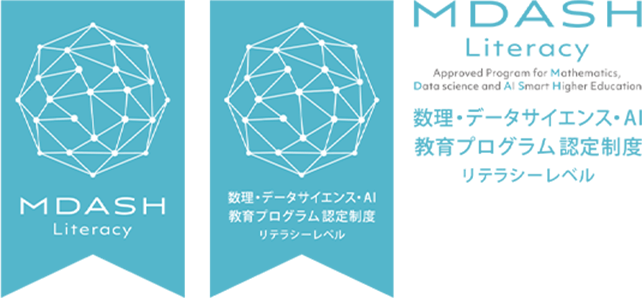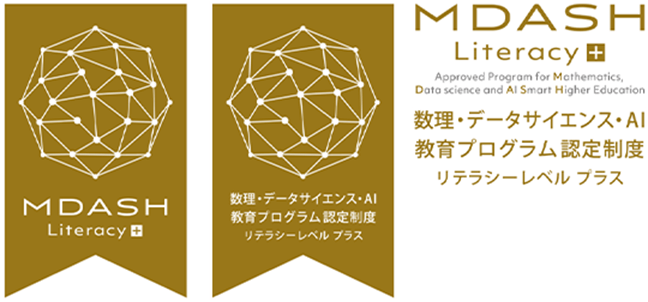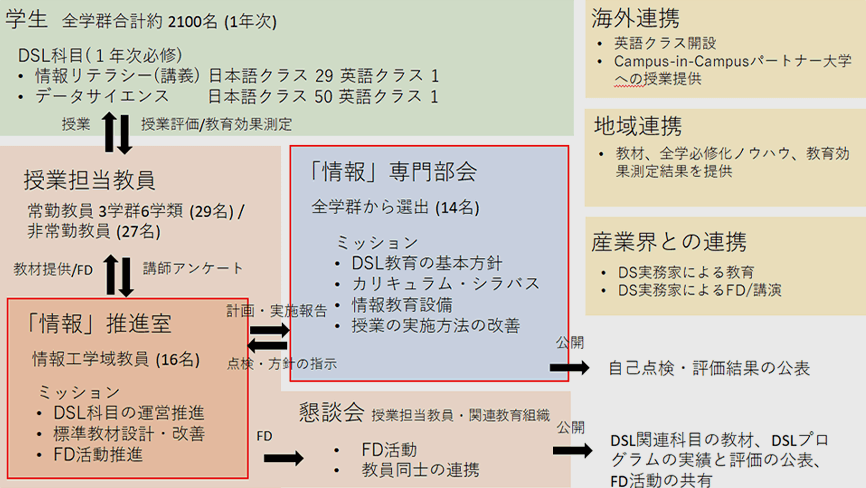
Undergraduate Education
Data Science Literacy Program
With the development of information technology in recent years, technology to properly collect and manage information and effectively utilize the results of its analysis has become indispensable in all fields. In academia, the importance of data science as the fourth paradigm to drive research by collecting and analyzing large amounts of data is widely recognized. In the field of industry, the creation of value through the effective accumulation and utilization of data has come to play a major role in strengthening industrial competitiveness. Furthermore, rapidly developing artificial intelligence technology is reaching a level that surpasses human recognition and judgment in some fields. This change in the social environment based on the technological background is also driving a change in how universities should develop professionals.
With this in mind, the University of Tsukuba established the Data Science Literacy Program (DSL Program), which consists of two required subjects for first-year students in all fields. These subjects are Information Literacy, aimed at acquiring basic information literacy and computer usage skills, and Data Science, aimed at acquiring an objective approach to decision-making based on data.
The University's DSL Program is accredited under the Approved Program for Mathematics, Data science and AI Smart Higher Education/Literacy established by the Ministry of Education, Culture, Sports, Science and Technology (MEXT) to improve basic skills in mathematics, data science, and AI and to expand opportunities for such skills. Among them, the program has been selected for the Approved Program for Mathematics, Data science and AI Smart Higher Education/Literacy Plus, which is given to programs that are at the forefront of the field and have unique innovations and features.
-

(認定の有効期限:令和8年3月31日まで)
-

(認定の有効期限:令和8年3月31日まで)
Reference
Approved Program for Mathematics, Data science and AI Smart Higher Education, MEXT (Japanese) Application details for the Approved Program of the University of Tsukuba [PDF] (Japanese)Overview of Data Science
Literacy (DSL) Program

Features of the DSL Program
-
Feature 1: 100% completion rate of the DSL program at graduation for students entering the class of 2019 and thereafter
The University of Tsukuba has students with backgrounds spanning a wide range of academic fields, including not only humanities and sciences, but also physical education and the arts, which is unparalleled for a comprehensive university. Starting in 2019, Information Literacy (lecture) and Data Science became required subjects for first-year students in all fields. With all first-year students required to take the subjects, we have created educational materials that are applicable to all undergraduate courses and meet the needs of society, not only in the fields of science and engineering, but also in the humanities, physical education, arts, and other non-technical fields. These materials are used throughout the university.
-
Feature 2: Curriculum that emphasizes practical skills
The DSL program combines lectures and practical exercises to give students a more hands-on approach to learning. The curriculum is designed to provide comprehensive education not only in statistical analysis, but also in the data science lifecycle, including data collection, management, and analysis, with an emphasis on practical skills through practical exercises using real-world data. Refer to the curriculum for details.
-
Feature 3: Design of teaching materials based on evidence (measurement of educational effectiveness, etc.)
We have compiled information on class details, motivation for learning, and level of retention obtained not only through student class evaluation questionnaires, but also through educational effectiveness measurements that objectively evaluate motivation for learning and understanding of data science, and questionnaires for lecturers, including those with work experience in the private sector, to improve teaching materials in the general foundation subjects "Information Literacy" Management Office. The curriculum is designed so that students from various fields, including those who are unfamiliar with data science and those who want a more advanced level of learning, can engage in data science studies with strong motivation.
-
Feature 4: Introductory video lectures in a variety of disciplines to increase interest and motivation among a diverse student body
For first-year students who are new to data science, we incorporate video lectures in which faculty members from various academic fields introduce examples of data applications in their respective fields of expertise. At present, we have 26 video materials ranging from general contents such as big data and artificial intelligence to application examples in the fields of clinical medicine and sports, which are used to increase learning motivation and educational effectiveness for students from various backgrounds. This video materials are also available as OpenCourseWare online for anyone to view, and we aim to further enhance these materials in the future. For more information, please visit e-Learning.
Abilities That Can Be Acquired through
This Educational Program
Through lectures and practical exercises on data utilization, students will experience a series of data science cycles, such as setting analysis goals, data collection, preprocessing, analysis, and feedback of analysis results. This enables students to independently analyze various problems in society and acquire the ability to make improvements toward the realization of a better society. Through lectures on AI, students will gain essential knowledge to survive in an AI-driven society.
System
| Committee | Roles |
|---|---|
| Chairman of Information Technical Committee | Responsible for the administration of the program |
| Information Technical Committee | Planning, enrichment, organization and improvement of the program and creation of a fixed timetable |
| "Information Literacy" Management Office | Curriculum development and implementation |
Courses and Learning Content
Completion Requirements
Students must obtain 3 credits in two subjects: Information Literacy (lecture) (1 credit) and Data Science (2 credits).
Credit Acquisition Requirements
- Information Literacy (lecture): Grades of A+ to D are determined based on the overall evaluation of achievement tests, report assignments, and other factors. Credits will be awarded with a grade of C or higher.
- Data Science: Grades of A+ to D are determined based on the overall evaluation of achievement tests, report assignments, and other factors. Credits will be awarded with a grade of C or higher.
| Subjects | Details |
|---|---|
| Information Literacy (lecture) | Students will learn about the principles of computers, software, and the structure of the Internet, based on an understanding of the basic concepts of information and the place of computers and the Internet in society. In addition, students will learn about information ethics, information security, and intellectual property rights necessary for safe and meaningful use of the Internet. |
| Data Science | Students will understand the basic concepts of data science and learn basic data analysis techniques using computers.
Students will acquire practical techniques for understanding and utilizing data through data collection, data management, data visualization, and data analysis. Students will be exposed to cutting-edge data science case studies and gain an understanding of the specific applications of data in society. |
Teaching Methods
Information Literacy (lecture) and Data Science are required first-year subjects for all students. Information Literacy (lecture) is offered in 29 classes in Japanese and 1 class in English, and Data Science is offered in 50 classes in Japanese and 1 class in English, so that all students can take these subjects. In Data Science, we have prepared a model curriculum with three levels of difficulty to match the learning difficulty level of each student's attributes, and have created teaching materials that meet the needs of society and are applicable to all undergraduate courses, from science and engineering to non-technical fields. In addition, we use the results of educational effectiveness measurements for all students, a course participant questionnaire, a questionnaire for lecturers, and feedback on course materials from class instructors in designing course materials to ensure that the materials are suitable for students from various fields, including students who are not familiar with data science and students who desire a higher level of learning.
Model Curriculum Equivalent
The content and outline of the classes that make up the program (corresponding to the Electives of the Model Curriculum for Mathematics, Data Science and AI (Literacy Level)) are as follows.
| Content and elements included in the class | Class Name |
|---|---|
| Basics of statistics and mathematics | Data Science |
| Basics of algorithms | Information Literacy (lecture) |
| Basics of data structures and programming | Information Literacy (lecture) |
| Time series data analysis | Data Science |
| Data handling | Data Science |
| Data application practice (supervised learning) | Data Science |
